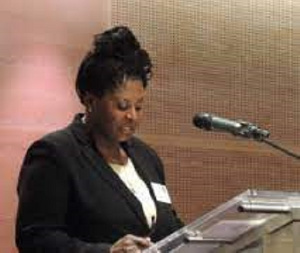- Home - News
- Polls
- Year In Review
- News Archive
- Crime & Punishment
- Politics
- Regional
- Editorial
- Health
- Ghanaians Abroad
- Tabloid
- Africa
- Religion
- Election 2020
- Coronavirus
- Photo Archives
- News Headlines
- Press Release
Regional News of Thursday, 9 December 2021
Source: GNA
Call for proper treatment of gender-based crimes
More than 20 years after the Rome Statute that saw the establishment of the International Criminal Court, there is still no guarantee of proper treatment of crimes of sexual and gender-based violence, a virtual side event during the current 20th Assembly of States Parties (ASP) of the Court in The Hague has been told.
Gabrielle Louise McIntyre, Chairperson of advocacy group Women’s Initiatives for Gender Justice, made the call while speaking during the event on Gender-Sensitive Judging in International Criminal Courts, co-hosted by Africa Legal Aid (AFLA), Uganda, Australia and The Netherlands.
Speaking from Seychelles, Ms. McIntyre, who is also Chairperson of the country’s Truth, Reconciliation, and National Unity Commission, said: “…none of the provisions of the ICC’s regulatory framework guarantee that the Court will ensure justice with regards to crimes of wartime sexual violence.”
She said this could be seen in the “initial failures on the part of the ICC Prosecutor to include charges when evidence of sexual and gender-based violence was present or to adduce sufficient evidence to support charges of sexual and gender-based violence when brought.”
Ms. McIntyre added: “These failings appear partly indicative of latent gendered assumptions about the lesser importance of sexual violence crimes but also signify victim reluctance to participate in formal justice processes.
“Moreover, some of the ICC’s judicial rulings have propelled outmoded understandings of sexual and gender-based crimes, signalling a lack of understanding of the drivers of these crimes and resulting in the perpetuation of stereotypes about sexual violence.”
Ms. McIntyre said that such decisions had been made at the ICC “despite relative gender balance on the bench, underscoring that the solution is not simply adding more women to the mix – gender consciousness is required.”
She said that this was not to suggest there had been “no significant progress in the treatment of these crimes at the ICC”.
She cited the trial of Dominic Ongwen a Ugandan rebel commander, but argued that the failure to properly investigate and include sexual and gender-based crimes against men in that case “reflects gendered assumptions about who can be victims of these crimes.”
Ms. McIntyre added: “But the guarantee of proper treatment of crimes of sexual and gender-based violence still appears to remain a fragile proposition more than 20 years after the promises of Rome.”
Evelyn Ankumah, Executive Director of AFLA, said: “Improved gender dynamics in international courts and tribunals and gender-sensitive adjudication, will advance full and equal participation of women…thereby ensuring a more inclusive and impartial justice system.
“To ensure that the administration of justice is approached with a gender-sensitive lens that provides safe space for women is actually not the work of judges or female judges alone.
“It should involve all stakeholders – both internal and external actors,” Ms. Ankumah added.
Judge Althea Alexis-Windsor of the ICC said that “it may appear that gender-based targeting was incidental and opportunistic.”
“However, history has shown that gender-based targeting, even in, or especially in times of conflict, can be purposeful and specific,” she added.
Another ICC judge, Socorro Flores, said women and girls “face structural discrimination during their lives.”
She said that this “also affects the way justice is delivered.”
Judge Flores continued: “The invisible patriarchal stereotypes and social constructions, generate inherent biases in justice mechanisms.
“Judges all over the world, no matter their gender, do not escape social constructions.
“They are not immune to stereotypes and patriarchal attitudes.
“Discrimination is so normalised that sometimes we are not able to see it before our eyes. That is why gender sensitivity training becomes extremely important for all judges,” she added.
AFLA has been holding a informal Gender-Sensitive Judging Series over the last few months, but the one on Tuesday was the first to be held in public, with speakers making their presentations virtually.
Entertainment










